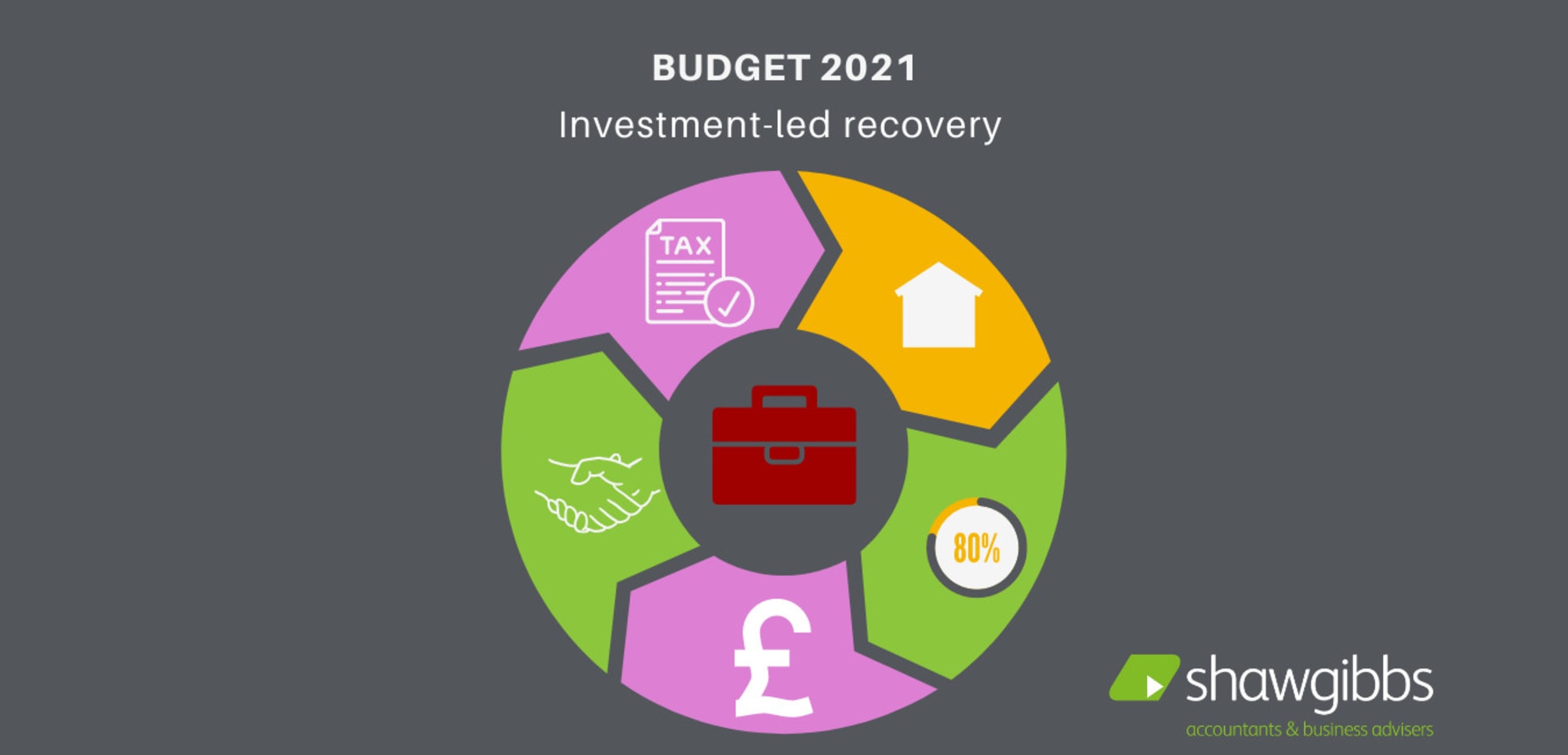Article
Budget 2021 Investment-led recovery
Article
Budget 2021 Investment-led recovery
March 3, 2021
7 minute read
Rishi Sunak opened his UK Budget announcement today with the facts that although are not unfamiliar to us, are still a harsh reality. The UK has suffered the largest shrink in the economy in 300 years and the Government has borrowed at levels not seen since wartime.

Rishi Sunak opened his UK Budget announcement today with the facts that although are not unfamiliar to us, are still a harsh reality. The UK has suffered the largest shrink in the economy in 300 years and the Government has borrowed at levels not seen since wartime.
“This was an investment-led Budget” says Peter O’Connell, Managing Director of Shaw Gibbs
“The Chancellor is encouraging business owners to invest into capital purchases, employment and into their own skills in order to help to recover the economy.”
Sunak delivered his three-point plan which covered:
- Supporting the British people and business to recover
- Fixing public finances
- Building the UK’s economy
Whilst we await the full Budget report, the headline points from our perspective follow.
Corporation tax to increase to 25% in 2023
The headline rate of corporation tax will go up from 19% to 25% in 2023, with an exemption for smaller businesses, according to the treasury this will raise an additional £17bn a year.
The new rate won’t apply to businesses with profits of less than £50k and only businesses with profits of over £250k will pay the full tax, Sunak estimates this to be 30% of UK businesses.
The chancellor added that even with the higher rate, the UK would have the lowest corporation tax rate of the G7 countries and, that it is ‘fair and necessary for them to contribute to our recovery’.
Phil Dickinson, Tax Partner comments
“It is now more relevant to restructure and to look at how profits are accounted. It is possible that we will see a raft of businesses looking into the options of dis-incorporation. This goes against years of incentivisation by the Government for businesses to incorporate via the low corporation tax regime in the UK.
This may also discourage overseas companies looking to set up operations in the UK, especially our European neighbours who are already wary of the complexities which have arisen due to Brexit.
High marginal rates may also become an issue where a company is in the band between £50 and £250k of profits. This is due to the ‘tapering up’ of the tax in this middle-band before the flat rate of 25% applies. We have seen this in the past and there is a possibility that those who are in the middle-band will pay more than the 25%.”
Companies will be able to offset losses of up to £2m up to three years
Previously a company was able to offset losses in the last tax year.
This applies to companies who have had profit in the last three years and will allow them to claim tax rebates of up to £760k.
Pending the detail, the assumption is that the rebates which will be able to be recovered will be based on corporation tax returns in 2022.
Residential Stamp Duty holiday has been extended to 30 June 2021
This means that that no Stamp Duty will be payable on the first £500k of the purchase price of a residential property and this will then reduce to £250k to the end of September.
Sarah Gardener, Head of Property adds
“I welcome the tapering-off approach for the Stamp Duty holiday rather than the property market falling off a cliff-edge. However, the market was relatively buoyant already due to pent-up demand resulting from the various lockdowns. Many professionals I know in the market are not welcoming the spike and we have already seen huge bottle-necks in relation to getting house sales completed within the timeframes.”
Government guarantee for those who can only afford a 5% deposit
Turning ‘generation rent into generation buy’, the Government will offer a guarantee for those who are looking to borrow up to 95% of the property price.
A risky strategy according to Ed Gibson, Head of Financial Planning.
“Let’s hope we won’t return to the 110% of LTV mortgages which contributed to the credit crunch in 2008”
A tax ‘Super reduction’ where companies who invest can reduce tax bill by 130%
“The Bank of England have been telling us for 10 years that productivity in Britain has stagnated. Perhaps this bold move by the Chancellor will help to encourage investment to boost productivity. It will certainly be a welcome tax deduction for those businesses who need to spend considerable funds on plant and machinery – and it seems that the expenditure that attracts relief may not be capped (subject to the small print of course!)”
Says Steve Neal, Head of Audit.
BADR remains at 10%
It had been widely anticipated that the Budget would include some important changes to Capital Gains Tax (CGT), and Business Assets Disposal Relief (BADR), previously called Entrepreneurs’ Relief.
Hayley Simmons, Head of Insolvency & Advisory notes
“The amount of tax personally payable by shareholders following a solvent liquidation will increase substantially if CGT/BADR increase in the future. To ensure shareholders will only pay the current tax rate, it is a good idea to think about moving plans forward before the criteria for BADR change. This is particularly applicable to private sector consultants impacted by the upcoming IR35 changes, with historic limited entities which are no longer needed.”
Other measures which we will cover in more detail (where relevant) included:
1. Supporting the British people and business in recovery
- The furlough scheme – will be extended to September 2021
- No change for employees, who will still receive 80% of their pay
- Employers will be asked to contribute 10% from July and 20% in August and September
- SEISS Grants – will be extended to September 2021
-
- Grants will be ratcheted down gradually
-
- Those where turnover has fallen by 30% or more will continue to receive the 80% grant
-
- 4th and 5th grants can be claimed by those who became self-employed last year
- Additional ‘Restart’ grants
-
- These will be made available for sectors most seriously affected by the pandemic such as arts and sports organisations, non-essential retail, leisure and hospitality
- Bounce-back and other coronavirus loans for businesses will be replaced by a new ‘Recovery loan scheme’ with 80% guaranteed by the government
- Business rates relief – will be extended to the end of June and will drop to two thirds after this point
- VAT at 5% for hospitality and tourism sector – to be extended to end September 2021
-
- An interim rate of 12.5% will then be in place for another six months
-
- The standard rate (of 20%) will be in place by April 2022.
2. Fixing public finances
- Personal tax thresholds will remain as they are
- There will be a freeze on VAT and NICs
- The VAT registration threshold will remain at a turnover of £85k
- Personal lifetime allowances will be frozen
- Alcohol and fuel duties are frozen
3. Building the UK’s economy
- The first UK infrastructure bank will be set up purely to invest into green initiatives
- There will be significant Investment into offshore wind initiatives
- A new savings product will be launched for consumers to invest into green initiatives
- UK businesses from any sector that have been operating for more than one year, with between 5 to 249 employees are eligible for two growth schemes:
-
- Help to grow management – a 12-week executive development programme which will be available from June with the Government contributing 90% of costs
-
- Help to grow digital – offering 50% discount on performance enhancing software and a wealth of free advice (register https://helptogrow.campaign.gov.uk/)
- There will be £1.6bn investment into ‘high growth, innovative companies’ including improvements in R&D and EIS
- Improvements will be made to the Visa application process for highly-skilled migrants
- Eight ‘Freeports’ will be set up in England with cheaper customs and favourable tariffs, VAT or duties
- The deployment of 1,000 Tax Investigators in order to address tax avoidance/under-reporting
Related content
Need expert advice?
Speak to an expert for advice on
+44-1865 292200 or get in touch online to find out how Shaw Gibbs can help you
Email
info@shawgibbs.com
Need expert advice?
Speak to an expert for advice on
+44-1865 292200 or get in touch online to find out how Shaw Gibbs can help you
Email
info@shawgibbs.com




